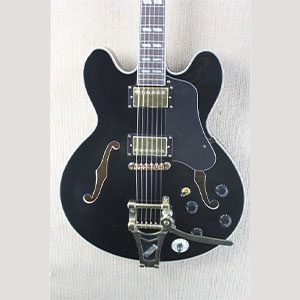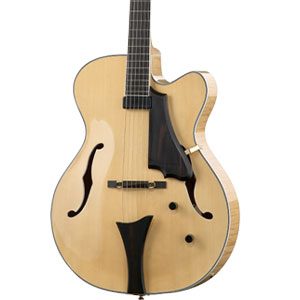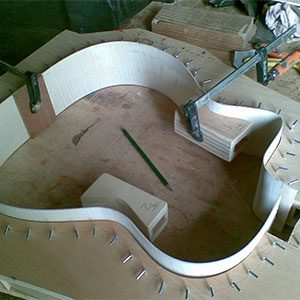- Home
- Instruments
- Gear
- Recording
- Lessons
- Reviews
- Blog

Shopping for a jazz guitar is a very personal experience. The truth is that there are so many great guitars and very few to choose from at the same time. This may come across as very confusing, however it’s the only way you can describe the situation.
We will expand on this a bit later in the text. First and foremost, if you’re wondering whether or not you need a jazz guitar to play jazz, we’ve answered that question in our article here ‘Do You Need a Jazz Guitar to play Jazz’. We won’t go too deep into this subject again, but the information this guide contains should be an indicator of sorts.
Back to why we’re all here. Finding the perfect jazz guitar for you depends on a number of factors, most of which are unique to you and your playing style. Today we’re won’t tell you which guitar model to get, but rather which guitar types will give you the tonal range and some other qualities that are desirable for jazz music.
When someone asks what makes up a jazz guitar, one answer should come before anything else. It’s that jazz tone that is the core factor you’re looking for in a guitar. Believe it or not, every style of electric guitar can give you a great jazz tone.
This is something that depends on the specific model more than it does on the type of a guitar. With that said, the best types of guitars that will give you the tonal properties you need in most cases can be boiled down to three different kinds. We will go over each one and talk a bit about the benefits and drawbacks.
 A solid body guitar is not what you generally expect a jazz guitar to be like. However, there are a decent number of solid body guitars out there that fit the bill perfectly. All you have to do is find the one whose tone is best suited for your style. In general, a solid body guitar that is great for jazz will have a decent pair of humbuckers. We’re talking vintage style pups as they have the closest color of tone for our needs. You want to avoid single coils as much as possible.
A solid body guitar is not what you generally expect a jazz guitar to be like. However, there are a decent number of solid body guitars out there that fit the bill perfectly. All you have to do is find the one whose tone is best suited for your style. In general, a solid body guitar that is great for jazz will have a decent pair of humbuckers. We’re talking vintage style pups as they have the closest color of tone for our needs. You want to avoid single coils as much as possible.
Their nature prevents them from offering the warmth and range that are necessary for a complete jazz experience. The benefit of using a solid body guitar is the increased comfort, and the fact that every guitar player will be familiar with this design.
Humbucker design greatly reduces the feedback which is what most of the ‘real’ jazz guitars bring to the table. Depending on where you shop, and what you find, you can get a pretty decent solid body guitar for an affordable sum of money. Last but not the least, we have to mention versatility. When you’re dealing with solid body guitars, you have a very broad spectrum of tones you can dial in, at least in terms of jazz music.
 Now that we’ve gone to the odd parts of the jazz guitar world, let’s head back to the mainstream. Archtop guitars have been the go-to choice for a great number of jazz guitarists over the years. Their design, style and sound are what many describe as the core of jazz guitar. So what exactly makes these guitars so great for jazz? Before we go any further, we need to mention that archtop usually refers to both semi-hollow and hollow guitars. Sometimes this term is used for an even broader group of electric guitars.
Now that we’ve gone to the odd parts of the jazz guitar world, let’s head back to the mainstream. Archtop guitars have been the go-to choice for a great number of jazz guitarists over the years. Their design, style and sound are what many describe as the core of jazz guitar. So what exactly makes these guitars so great for jazz? Before we go any further, we need to mention that archtop usually refers to both semi-hollow and hollow guitars. Sometimes this term is used for an even broader group of electric guitars.
However, for our needs, we will stick to semi-hollow and hollow guitars. At this point, some of you are probably wondering what the difference between the two is and then compared to a solid body guitar.
Let’s start with the basics. Unlike the solid body guitars, semi-hollow and hollow guitars have a cavity within the body. Semi-hollow guitars have a block of wood beneath the bridge and all of the electronics, while a hollow guitar doesn’t. In terms of aesthetics both of these look pretty similar, but it’s the sound where you’ll start to see the real difference.
Hollow guitars have a soundbox that adds a very specific touch to the tone of the instrument. Depending on what type of music you play, this can be a good or a bad thing. For the purpose of jazz, it’s usually the former. Semi-hollows have partial cavities on each side of the bridge.
Their tone doesn’t have as much of that natural resonance, but they often have a better tone when played at higher volumes. The main issue with these two types of guitars is their nature which is prone to feedback and other issue. You need to know how to play these guitars specifically. That is just too much for some. Also, their unique shape makes them a bit cumbersome for players of smaller stature.
 It’s often times said that the best jazz guitar you will ever play will the one you had custom made specifically for yourself. The reasoning behind this is the fact that every jazz player has their own set of requirements and preferences when it comes to their jazz guitars.
It’s often times said that the best jazz guitar you will ever play will the one you had custom made specifically for yourself. The reasoning behind this is the fact that every jazz player has their own set of requirements and preferences when it comes to their jazz guitars.
Often times the models which are readily available on the market won’t meet a decent amount of those standards. That’s when you bite the bullet and get the best luthier you can find, and contract him to make a jazz guitar following your input. Aside from costing a whole lot of money, one of the main issues with this approach has nothing to do with guitars.
It has everything to do with how well you know what you want. Think about it. The luthier is there to craft an instrument based on your specs. If you end up with something you don’t like, chances are it’s on you and not the person who built the guitar for you. Because of this, taking the custom made route is only advisable if you have enough experience and a developed taste.
Shopping for jazz guitars is definitely a different kind of experience. It takes a lot more effort and time to research everything compared to shopping for a standard rock/blues guitar. We won’t try to sway you to get one kind of a guitar listed here, or another. What we urge you to do is find which style of guitars we talked about fits you the best, both in terms of shape and tonal properties. You can take it from there.
With all that out of the way, feel free to dive into the meaty bit and consult our list of Best Jazz Guitars on the market today.

Reader Interactions